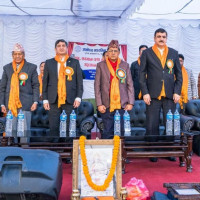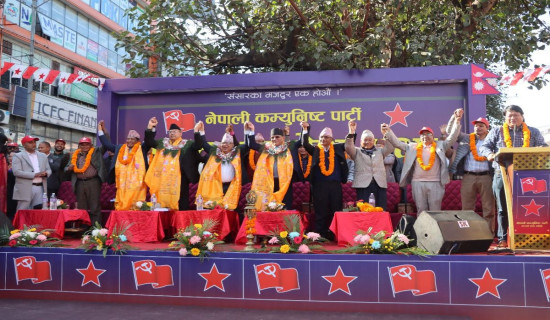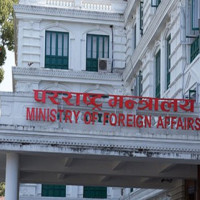- Monday, 1 December 2025
Altitude sickness cases high in Mustang
By Hari Krishna Sharma,Mustang, Oct. 14: Authorities in Mustang have urged domestic and international travellers not to make hasty trips to the mountainous district after several cases of altitude sickness led to hospitalisations and fatalities in recent weeks.
On October 9, Abjal Khan, 55, from Siparmai Rural Municipality-5, Parsa, died after suffering from severe altitude sickness in Varagung Muktchhetra Rural Municipality-1, Rani Pauwa.
Khan, who had arrived about six weeks earlier for timber-related work, had been complaining of headaches for several days before collapsing. Despite being taken to the Provincial Hospital in Jomsom after initial treatment at Jharikot Health Post, doctors declared him dead on arrival.
Similarly, 72-year-old Madhav Prasad Upreti from Mahalaxmi Municipality-4, Imadol, Lalitpur, died during a pilgrimage to Muktinath on October 10. He experienced severe chest pain at a hotel in Gharpajhong Rural Municipality-3 and passed away while receiving treatment.
Although the post-mortem reports are pending, both cases showed clear symptoms of altitude sickness, said DSP Bishal Adhikari, Spokesperson for Mustang District Police Office.
According to hospital records, the Provincial Hospital Jomsom treated 14 altitude sickness patients in mid-July to mid-August, 43 from mid-August to mid-September, and 78 from mid-September to mid-October. Two deaths from altitude sickness have been reported so far in the ongoing fiscal year 2025/26.
With festive season attracting large numbers of domestic tourists to Mustang, all five rural municipalities have reported a rise in altitude related health complaints among tourists.
Chief District Officer (CDO) Bishnu Prasad Bhushal said that many travellers reach Upper Mustang in a single day without proper acclimatisation. “Those who travel straight to high altitudes without preparation are at greater risk. We have launched awareness campaigns at the Ghasa entry point to inform visitors about preventive measures,” he said.
As Chairperson of the Muktinath Temple Management Committee, Bhushal added that awareness leaflets are being distributed through police and traffic officers. “Please do not rush your trip to Mustang,” he urged. “Altitude sickness can be fatal. Travellers with chronic illnesses should seek medical advice before visiting.”
In response to the rising number of cases, health check-up facilities have been set up at three locations around the Muktinath Temple, at the entrance, along the stairs, and inside the premises, with support from the Varagung Muktichhetra Rural Municipality and the Provincial Hospital Jomsom. The High-Altitude Treatment Centre also deploys medical staff to assist pilgrims and trekkers who experience symptoms during their visit.
“Rapid ascent increases the risk of altitude sickness, but health screenings have made it easier to identify and treat affected pilgrims,” said Health Assistant Ajay Thapa. The centre examines around 50 people per day during peak season and about 10 in the off-season.
Dr. Samiksha Kandel, acting chief of the Provincial Hospital Jomsom, explained, “Altitude sickness occurs when the body’s oxygen level drops above 2,500 metres. Early detection and prompt treatment can save lives, but many seek help only after severe complications arise.”
Common symptoms include headache, dizziness, fatigue, and nausea. Patients should rest, stay hydrated and descend to a lower altitude if symptoms worsen, doctors advise. Neglecting these symptoms can cause brain or lung swelling, leading to death.
To minimise the risk this year, all five municipalities, Thasang, Gharpajhong, Baragung Muktichhetra, Lo-Ghekar Damodarkunda and Lo-Manthang, have prioritised awareness and medical preparedness.
As part of preventive measures, Lo-Manthang Rural Municipality has begun offering a free ambulance service for tourists affected by altitude sickness.
“Visitors travelling as high as the Korala border point at 4,650 metres are suffering from oxygen deficiency,” said Municipality Chair Tashi Nhurbu Gurung. “Patients with serious conditions are referred to Jomsom Hospital after initial treatment at local health posts.”
Chief Administrative Officer Bikash KC said that information campaigns have been launched urging visitors to avoid alcohol, stay warm, drink sufficient fluids and consult doctors before travelling, especially those with chronic diseases.
Hotel owners and local representatives have also been asked to report any tourists showing symptoms of altitude sickness.
The Korala–Jomsom–Beni road spans 186 kilometres, while the route from Pokhara to the Chinese border at Korala covers 251 kilometres. Improved road access has made Mustang more accessible, but officials warn that rapid travel from lowland areas to high altitudes without acclimatisation remains dangerous.
















